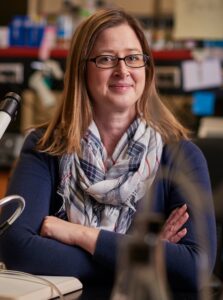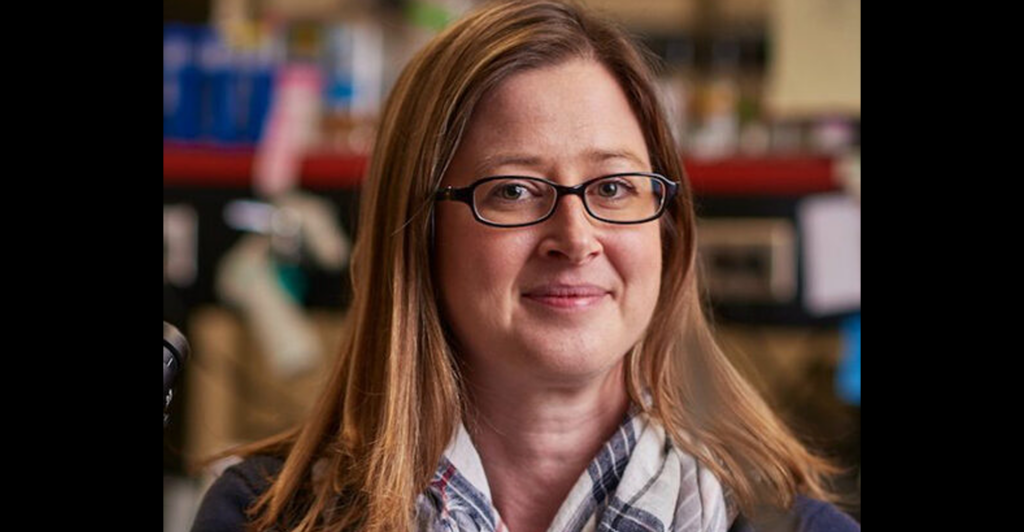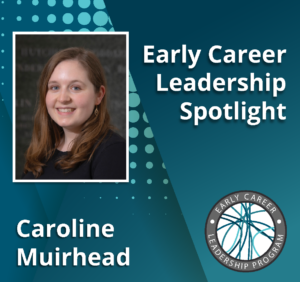By Sharifu Tusuubira
In the Paths to Science Policy series, we talk to individuals who have a passion for science policy and are active in advocacy through their various roles and careers. The series aims to inform and guide early career scientists interested in science policy. This series is brought to you by the GSA Early Career Scientist Policy and Advocacy Subcommittee.

We interviewed Dr. Sonia Hall, the President and Chief Executive Officer at BioKansas, a non-profit organization that fosters and supports the regional bioscience ecosystem. Sonia is also a board member of the Council of State Bioscience Associations, and she previously worked as the Director of Engagement and Development for the Genetics Society of America. During her career, she developed numerous educational outreach activities, including co-founding Kansas DNA Day. Sonia advocated for policy change to modernize graduate education and designed communication projects to highlight the important contributions of scientists with diverse life histories. Here, we talk with her about her non-traditional undergraduate experience, how her background in business helped her succeed, and what early career scientists can do to get the training they need for a successful career.
As someone who started their career in business, what sparked your interest in becoming a science policy champion?
I was a non-traditional undergraduate student with a decade of work experience in business, two children, and a husband. This made the inequities that exist within higher education and the subsequent opportunities that people get to pursue, very pronounced. I was fortunate to land a really wonderful undergraduate research lab experience with Rob Ward at the University of Kansas. I also received a travel award from the University of Kansas that allowed me to attend my first national conference as an undergraduate. These opportunities altered my trajectory. I applied to the molecular, cellular, and developmental biology program at the University of Kansas and was accepted. The business experience that I brought with me helped me realize that there was a disconnect between the training that was being provided to early career scientists and what was actually needed to succeed in the workplace. This realization allowed me to carve out a unique opportunity to create programming both at the institutional and national level through service with my professional society, the Genetics Society of America. I never lost sight of the inequities and systemic constraints that make it challenging for individuals with diverse life histories to be successful in higher education.
What role do you see investments, such as attending conferences, having in terms of guiding scientists?
Sometimes, they’re an access point to opportunity. I likely wouldn’t have been able to go to that conference as an undergraduate without that support. I wonder if there’s sufficient funding to enhance equity within the sciences. Looking at the levels of endowments, at different academic institutions, you’d see some disparity. At an institution like the University of Kansas, which has a lot of international and first-generation students getting a PhD or those coming from rural communities where access to science and scientific training isn’t always as available as it is in an urban core, it is critically important to have those types of travel grants at a high enough frequency.
What role did you play at the GSA to support early career scientists’ access to opportunities?
When I was working at GSA, I founded the Early Career Leadership Program (ECLP). The inspiration for this program was the need to demonstrate that early career scientists have valuable contributions that they can make to the scientific enterprise, even if they haven’t completed their degree or their postdoctoral work. In the ECLP, students had the access to develop these skills, build network connections, and create deliverables that they could then take out onto the job market to demonstrate that they could successfully do this type of work. This raised their visibility and demonstrated the valuable contributions early career scientists can make toward equity and inclusion. Furthermore, this helps make sure that they get that robust professional development training that they need while preparing them to enter a variety of different positions in any of the career pathways that they pursue.
At BioKansas, that is still integrated into a lot of our programs, but there’s an additional layer that we have here within the state. The midwest is really challenged by its retention of technically trained scientists. We’re such huge exporters of technically trained scientists, and so there is the need to figure out ways to be able to keep them here. If we utilize a community-based approach to raise our academic institutions to better support our early career scientists, that’s a really great way to share the responsibility, while also leveraging the unique strengths and competencies of those different groups.
What can early career scientists do to get involved or get the supplementary training that they need?
Students should get involved in professional societies and associations. The Genetics Society of America has a lot of really fantastic opportunities. Whatever your scientific discipline, find your professional society or association. In every single state, we have a BIO affiliate. They provide a great way to explore opportunities in industry and get industry-specific training.
Science entrepreneurship is the heart of innovation and commerce. How should we encourage scientists to go into entrepreneurship?
Our academic institutions are a great source of new discoveries and innovations. It’s a difficult path to go from that point of discovery into commercialization. However, that is how we increase the economic capacity and the innovation capacity of our world. For many students, there’s a lack of understanding of what that entrepreneurial pathway looks like and what that process is, so early on in graduate school, it would be useful to get students to think from within an entrepreneurial mindset.
The first step is stepping outside your academic walls and thinking about the individuals who understand the space. There are a lot of nonprofit organizations that work to support entrepreneurs. Learning about who they are and the support structures that are available is extremely important. As an early career scientist, you shouldn’t navigate the pathway alone. Let us help remove the barriers.
How should early career scientists handle mentorships as they transition out of grad school to postdoc to working?
It’s absolutely critical to have a mentor at all career levels. The number one thing is to know we don’t ever think that it’s a problem to not know something. We should be learning continuously. That’s one of the strengths that we, as academics, bring into the business community. We have that lifelong learning that we undergo, and mentorship is a way to obtain that learning. I have met some important people in my life as a professional since I’ve taken this role that I depend on, and they provide me with a lot of knowledge and background information as well. Mentors will help you decrease the energy and effort that you have to put into identifying each and every resource because they already have knowledge and expertise far beyond what you have.
Any parting words?
Going into higher education I realized that the system wasn’t built for people like me. I took the policy and advocacy pathway because I found that the way to disrupt systems and constraints that create inequity is by changing the policies and the processes that exist to keep the inequities in place. So, when I was an undergraduate, I committed to myself that I would do everything I could to change those systems so that other people didn’t encounter the same challenges that I did.
I think the most important thing that early career scientists need to do is to believe in themselves—when they start to get that feeling in the pit of their stomach that they could be making the wrong decision, they need to evaluate it. Sometimes that’s an opportunity knocking. Sometimes you have to explore that opportunity. I just think that there are so many times that early career scientists feel like they need to fit into the box that somebody else built when all they have to do is put their hand in or their foot. You don’t have to climb all the way in: you can create your own opportunity, build your own box, and make sure it has lots of windows.














